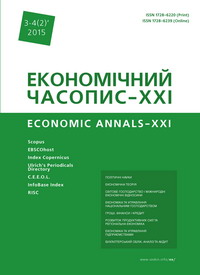Особливості формування витрат на виробництво органічної продукції рослинництва
Peculiarities of costs formation in the organic crop production yielding
Author(s): Alina Burlyay, Alexandr Burlyay, Аndrij KharenkoSubject(s): Economy
Published by: Institute of Society Transformation
Keywords: Organic Products; Costs of Production; Price
Summary/Abstract: Introduction. Today, product liability is an important problem in many countries, and environmental safety of farm products becomes one of the main factors of its external and internal competitiveness. Compared to conventional technology, the technology of organic crop yielding has significant differences which influence formation of cost production for these types of products, and thus, the efficiency. Purpose. To identify the features of input cost formation for organic crop yielding in Ukraine. Results. The cost of organic yielding significantly differs from the cost of agricultural production by traditional technology. It has a direct impact on pricing and, consequently, on the final financial result of an enterprise. Organic yielding is a production activity of legal entities and individuals-entrepreneurs (including cultivation and processing), where during this production the use of chemical fertilizers, pesticides, genetically modified organisms (GMOs) as well as preservatives is excluded. The agro-technical package of such production is based on adherence to crop rotation, use of trash, compost, green manure crops, conducting cultivation and plant protection with biological methods. In recent years, the number of organic producers in Ukraine increased from 31 in 2002 to 164 households in 2012 – by 429%. About 60% of Ukrainian fields are under wheat, barley, sunflower and corn. Also, domestic organic economy grows organic peas, rape, buckwheat, soybeans, rye, oat, sorghum, millet, mustard, and sainfoin. Production costs for organic farming are lower compared to traditional farming, especially for crop growing. Twenty years of research in Switzerland show that the input cost of crop production (primarily winter wheat and potatoes) by organic and conventional technologies are as follows: • Costs of maintaining fertility – 50% lower in organic farm; • Costs of disease control – 97% lower in organic farm; • Energy – 50% lower in the organic sector. Conclusion. Organic farming provides balanced state of ecosystem and guarantees economic and social development of society. In Ukraine, there is a growing number of organic farms. Organic production in Ukraine is more effective than traditional due to production costs cut on account of the peculiarities of technology (no cost for the purchase and use of fertilizers and plant protection products, fuel costs reducing, works are performed by external organizations), elimination of agricultural production, and huge amounts of natural reserve fund release without reduction of consumption.
Journal: Економічний часопис - ХХІ
- Issue Year: 2015
- Issue No: 3-4(2)
- Page Range: 29-32
- Page Count: 4

